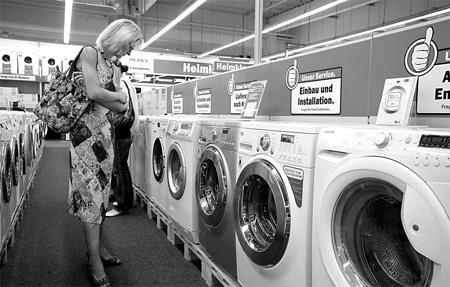
In Germany, rising business and consumer confidence has been underlined by more solid signs of recovery such as solid month-on-month increases in exports and industrial orders. Bloomberg News
After more than a year of economic gloom, Europeans are returning to the shops and venturing back into the housing market. Companies are slowing the pace at which they've been slashing jobs. Lending conditions are improving.
But central banks and some economists are cautioning against reading too much into all the recent data suggesting glimmers of a recovery from the global credit crisis, warning about the possibility of a damaging "double-dip" recession.
"There's good reason to be cautious," said Ben May, European economist at Capital Economics in London. "The surveys still aren't great and in the hard data there hasn't been convincing signs of a pickup."
Still, stock markets have risen and many recession-weary consumers appear to be focusing on reports showing that access to credit is improving and the rate of job cutting is slowing in Britain, while business confidence rose in France.
Economists are forecasting that the drastic plunge in growth for the 16 countries that use the euro will have slowed when figures for the second quarter are released tomorrow, to a 0.5 percent contraction compare to the quarter before - a significant improvement on the 2.5 percent plunge in the first quarter.
In Germany, Europe's biggest economy, rising business and consumer confidence has been underlined by more solid signs of recovery such as solid month-on-month increases in exports and industrial orders. German exports - the economy's backbone - were up 7 percent in June, their biggest rise in nearly three years, although they were still down 22.3 percent on the year; industrial orders were up 4.5 percent in June, following a 4.4 percent rise in May.
In Spain, the number of people filing claims for unemployment benefits fell for the third straight month in July, the biggest monthly drop in claims since July 2004. And an 11 percent fall in car sales in the same month was seen as a major improvement - in a market seen as a key indicator - over the 30-40 percent falls recorded in previous months.
The relatively good news - compared to the economic woes reported almost daily in recent months - has prompted a rise in consumer confidence across Europe, resulting in an increase in retail sales and a tentative return by buyers to the housing market.
Britain's Centre for Economics and Business Research predicts house prices will start rising again in 2010 after the falls caused by the credit crunch.
"For a couple months there was an excessive fear, compared to the reality of the economy, and now people are realizing that things aren't really as bad as they had heard," said Marc Touati, an economist at Global Equities in Paris.
However, Touati and other analysts warned against celebrating any recovery too early, highlighting the risk next year of the second half a so-called double-dip - when a nascent recovery sputters out and turns into another recession.





